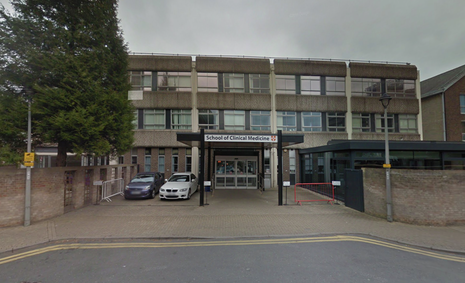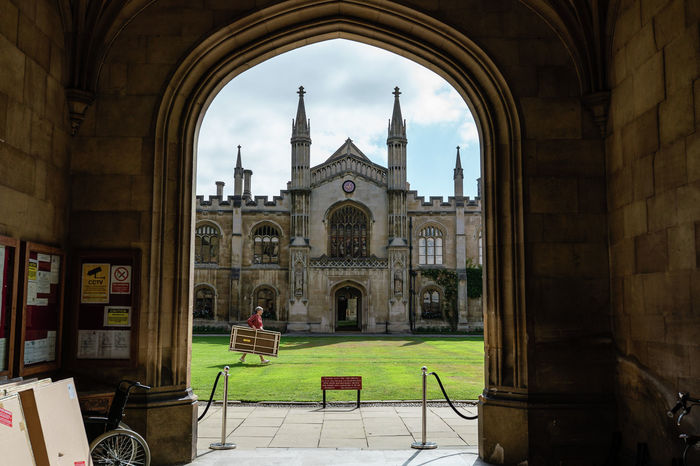Empower students to disclose disability, don’t do it behind our backs
Chay Graham criticises the culture of carelessness and insensitivity with which information regarding students’ disabilities is handled, urging the university to listen and work with students when designing systems of disclosure.

The Clinical School recently sent an email to students which contained an attachment detailing students’ mental health, reasons for intermission, and reports on their ‘fitness to practice as doctors’. I want to extend solidarity and empathy to all the students affected. Whilst undoubtedly an accident, this speaks volumes about the way information about students’ disabilities is carelessly shared amongst staff without our knowledge, due to a culture of negligence. Reading that the leak has been described as ‘extremely unfortunate’ and a ‘mistake’ did not satisfy me. In a culture where disability is not treated as respectfully as it should be, we should not fall into the trap of downplaying this incident as an unfortunate one-off: this was bound to happen. Why does a course administrator even have information about students’ mental health? Do they really need to know this in order to do their job? Why is this not behind basic password protection? I was far more encouraged to hear that the Clinical School has committed to a full investigation which will result in them meaningfully changing their policies and practices.
"All of our Colleges, Departments and Schools should be regularly investigating how they handle information about students’ health."
It’s not just the Clinical School that’s prone to such incidents. As a committee member in the Disabled Students’ Campaign for the last two years, I have heard countless students share tales where disclosure of their disability was done behind their back, unnecessarily and insensitively. In the worst cases, this has put students off asking for the help they need, or ever disclosing a disability. Data collated in the recent Varsity Disabled Access Report could suggest as many as 1 in 4 disabled students are potentially put off disclosing to the DRC. All of our Colleges, Departments and Schools should be regularly investigating how they handle information about students’ health.
I have experienced this personally. Recently after starting to disclose, in one of my first meetings with a teaching member of staff they awkwardly informed me: “It said on the document I was sent that you have attention deficit disorder…” Although they were clearly trying their best to open a dialogue, I was taken aback by the revelation that they knew this, and stumbled for a moment.
I try to be somewhat public about my ADHD in order to boost visibility of the under-discussed condition, but it’s not exactly the first thing I tell someone when meeting them, especially in my day-to-day university life. It’s not always clear to me how someone is going to react. Will they have preconceptions? What if they start treating me negatively? Am I going to have a time and a half explaining what it means to them? Especially with staff, this can be compounded by a feeling of initial language disconnect, or I dare say something of a generational divide. I winced a little, hearing someone actually say the word ‘deficit’ about me, even though I knew they didn’t mean anything by it; I much prefer the acronym, ADHD.
Thankfully, this staff member was very kind, and I tapped into my own self-advocacy. I explained what I needed from them, and we got on with teaching and learning. This is far from a universal experience for disabled people - I imagine for plenty of students and staff, that would be a difficult, stigmatizing, even embarrassing experience, that could lead to blocks in their relationship and education. Why was this staff member sent this about me? And why was I not informed that they had been told? Did they feel they were put in an awkward position, too, by me not knowing? Who else knows?
"This University needs to move towards a culture where disabled students are put in charge of the disclosure process. "
It doesn’t have to be like this. There is a saying in the disability rights movement which is ‘nothing about us without us.’ This means that decisions affecting us and our disability shouldn’t be taken without involving us in the decision-making. That goes for disclosure, too. This University needs to move towards a culture where disabled students are put in charge of the disclosure process.
During my time studying at the University of Dundee, this kind of approach was institutionally supported. Staff would always run things by me before communicating to other staff, when it involved disability. This let me moderate what ‘level’ of disclosure we were going to – whether it was requesting my teachers implement particular adjustments (no more info needed), informing a day-to-day mentor that I had a long-term condition, or explaining to a disability advisor the particulars so they could apply for targeted resources. I was always copied into threads disclosing my disability, and made aware of who held any files describing my disability or adjustments. I felt in control of the process, and encouraged to open up to staff at my own pace. I believe this approach is flexible for different students. Ultimately, a student-first approach goes against ableist, one-size-fits-all notions that disabled people amount to our discrete disabilities, enforcing through policy that we are each treated as diverse individuals with unique social needs.
Many staff at this University deeply care about disabled students, and want to help them get the most out of their time here. My experience of telling staff that I am neurodiverse, and might need to do things differently, has (on the whole) had a caring, thoughtful response. Sharing with them enables us to be closer - they get more out of working with me, and I get so much more out of my time with them. It is the lack of control I feel over ‘who knows what’ that is the issue for me, and contributes unnecessary stress to what could otherwise be a chance for affirmation. Please, co-design systems of disclosure with disabled students, that work with us, for everyone.
Connect with the Disabled Students’ Campaign: (Facebook: @CUSUdisabledstudents), (Twitter: @CUSU_Disabled).
Disability Resource Centre: https://www.disability.admin.cam.ac.uk/
 News / Right-wing billionaire Peter Thiel gives ‘antichrist’ lecture in Cambridge6 February 2026
News / Right-wing billionaire Peter Thiel gives ‘antichrist’ lecture in Cambridge6 February 2026 News / John’s duped into £10m overspend6 February 2026
News / John’s duped into £10m overspend6 February 2026 News / Epstein contacted Cambridge academics about research funding6 February 2026
News / Epstein contacted Cambridge academics about research funding6 February 2026 News / Lucy Cav students go on rent strike over hot water issues6 February 2026
News / Lucy Cav students go on rent strike over hot water issues6 February 2026 News / Corpus FemSoc no longer named after man6 February 2026
News / Corpus FemSoc no longer named after man6 February 2026










